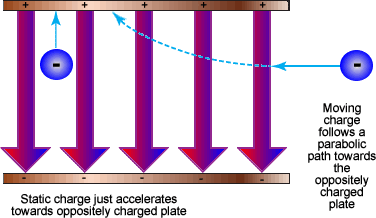    |
||||

Force Field |
||||
|
The field is represented in diagrams by field lines. These indicate the direction of the force with an arrow head and the strength of the force by the density of field lines (the closer the lines are together the stronger the field). The force field spreads out radially from a point source of the field or uniformly with parallel field lines if a uniform field is produced. A particle placed in a force field will experience a force acting upon it. This can be represented as a vector. The vector will have direction which depends upon the nature of the object at the point in the field (for example what charge it has). Force fields arise from the interaction of the mass of objects, of their static charge, and via magnetism between moving charges. Similarities and differences between gravitational and electrostatic force fieldsSimilarities: Both have inverse-square force laws that have many characteristics in common, eg use of field lines, use of potential concept, equipotential surfaces etc Differences: masses always attract, but charges may attract or repel |
||||
 |
||||

 A force field is a region in which a body experiences a non-contact force.
A force field is a region in which a body experiences a non-contact force. 
